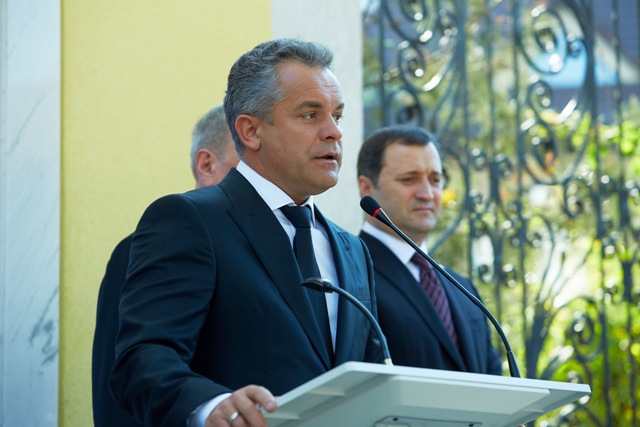
Moldovan Politics Begin to Resemble Post-Orange Revolution Ukraine
Publication: Eurasia Daily Monitor Volume: 10 Issue: 41
By:

As a series of political crises rumbled through the European Union and the United States, Moldova’s own recent political earthquake has barely registered in the West. Yet, trapped in the biggest political impasse since the collapse of the Soviet Union, Moldovan ruling elites are engaged in an uncompromising feud, resembling an Italian vendetta. In fact, what is unraveling today in Moldova greatly resembles the failure several years ago of the pro-Western parties in Ukraine.
This comes as a bitter disappointment to those EU states that supported Moldova in its European integration aspirations over the last few years. The European Union invested many hopes (and less treasure) in Moldova’s Alliance for European Integration (AIE), the ruling coalition of three self-proclaimed “democratic” parties. The three AIE members, including the Liberal-Democratic Party (PLDM), the Democratic Party (PDM) and the Liberal Party (PL), today appear unable to put aside their differences—not even for the sake of political self-preservation (see EDM, February 26, 27).
Moldova now faces the plausible risk of snap elections, as a motion of no confidence, initiated by the Communist Party (Kommersant.md, February 28), toppled the Vlad Filat government on March 5 after gathering the necessary number of votes in parliament with the help of the PDM. This will be a risky gamble for all parliamentary parties, according to one of the latest public opinion surveys openly available (Ipp.md, November 2012). This November 2012 poll suggested that public support for the Communist Party, the PDM and PL was in decline, and the PLDM, led by Prime Minister Filat, was the most trusted party among 40 percent of those interviewed. Nonetheless, the latest corruption scandals in the government would likely also negatively affect the prime minister and his party. A February survey revealed that a staggering 84 percent of respondents was unhappy with the performance of the current political leadership (Publica.md, February 25), which suggests broad distrust of all AIE members.
The PDM’s decision to support the Communist opposition’s motion and topple the Filat government, in which the PDM controls 5 out of the 16 ministries (Unimedia.md, December 31, 2010), appears irrational only at a first glance. The extant fuming conflict between the PLDM and PDM escalated on February 15, when Filat’s party joined the Communists in dismissing the deputy speaker of parliament, Vlad Plahotniuc (see EDM, February 26, 27), who is apparently also the main financier behind the PDM. The loss of his high official position weakens the legal and diplomatic insulation that Plahotniuc could have enjoyed in relation to a number of alleged financial investigations run against him in several EU countries (Adevarul.ro, November 8, 2012; unimedia.md, November 8, 2012; February 22, 25).
Given that snap elections would be highly risky for the PDM itself, Plahotniuc is probably only attempting to teach Filat a lesson. Indeed, Plathotniuc will likely have his party vote in favor of forming a new government to preserve the AIE coalition, while pressuring Filat along the way to possibly make additional concessions to the PDM. On the other hand, the PDM would also possibly withdraw support for a new government—thus provoking early elections—if it were able to obtain both coalition promises from the Communist Party and guarantees from Russia that would enforce the Communists’ commitment to a political alliance. The plausibility of this scenario would depend on the value of the business assets that both Plahotniuc and the Moldovan Communist Party have linked to Russia.
The highest risk, however, is not that the destruction of the AIE will impede the EU-integration project of Moldova. In fact, it was doomed from the very moment the EU failed in 2009 to pressure the AIE coalition to support much-needed institutional reforms. The current AIE coalition is plagued by corruption and rent-seeking among all three parties’ governing officials (Kommersant.md, February 16; noi.md, unimedia.md, February 27). The prime minister is left effectively at the mercy of coalition parties, which really own the individual ministries through the ministers they appointed. Every AIE-member party leads the ministries they control in a feudalist fashion, through personal loyalty links rather than according to the law. A report by a leading Moldovan think-tank, “Expert Group,” underscored the extremely poor performance of Moldova’s public institutions, emphasizing their lowest economic efficiency since 2008 (Noi.md, December 3).
Clearly, some urgent and pro-active European involvement in Moldova is needed—instead of the go-with-the-tide strategy that EU institutions and organizations working on Moldova have shown so far. It may be useful to remember that Western European countries did not walk their democratizing path alone, nor did they carry out their democratization with a velvet glove. In fact, in the post-World War II period, many of them outright banned or severely limited the left-wing parties that appeared to gain massive popular support. The United States’ Marshall Plan funding also helped Western Europe advance the building and consolidation of its democratic institutions during that very volatile transition period.
The failure of Ukraine’s Orange Revolution could be explained by the fact that its leaders did not have sufficient internal resources to feed democratic reforms and resist the transition’s pressures and lures; neither did they receive much needed support from the outside. Moldova’s AIE coalition is today in a very similar situation, with the state’s institutions too weak and compromised to be able to constrain the political misbehavior of the AIE’s members. Moldova needs its Western allies and partners to take off the velvet glove and strongly pressure and incentivize the AIE members into accepting real institutional reforms, starting with the law enforcement agencies. Such a transformation would satisfy the interests of the EU as well, if it wants to avoid seeing all the post-Soviet republics that form the Eastern Partnership fall back into authoritarianism and direct their political compasses to the geopolitical East.




